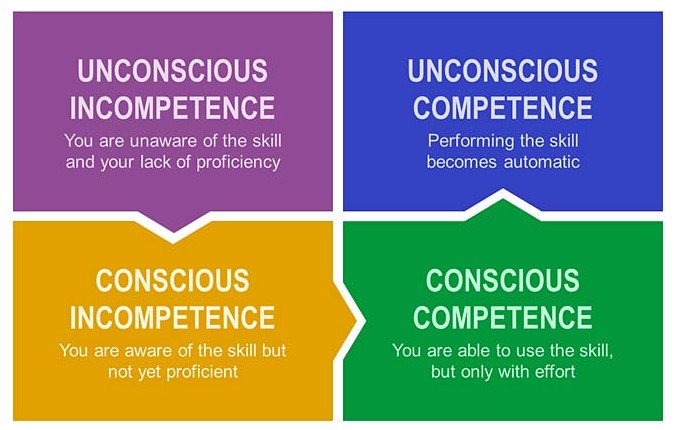Several of Troop 58’s adult leaders attended the University of Scouting in late February – a great event with just under 1,000 Scouters from across the National Capitol Area Council (and beyond) present. I attended a number of classes that covered a range of topics, but the one that stuck with me most involved the notion of “unconscious competence.” Lord Baden-Powell (the founder of Scouting) once said that Scouting’s motto – Be Prepared – meant “…that a Scout must prepare himself…so that he is never taken by surprise.” A tall order for most adults, for sure, but certainly a huge challenge for 11-18 year-old boys.
There are many articles one can read on this topic; a simple visual model of the natural learning progression is above. All of the colors and big words aside, the gist is that a Scout (as well as the rest of us) must continually practice a skill and learn to do it under real-life conditions to be truly competent in it. Tying a bowline knot or putting a pressure dressing on a fellow Scout at a Scout meeting is quite different when that bowline is going to pull a drowning family member out of the water or when the fellow Scout’s wound is gushing blood (both legitimate scenarios). This is one of the reasons we leave on Friday night for most camping trips…yes – we’re all tired from a full week of work and school…yes – we’re going to sit in a ton of traffic trying to leave NOVA in rush hour…yes – it will be dark when we get to camp (and often cold and/or wet). But getting comfortable setting up camp in the dark under a cold rain builds a sense of confidence that will serve the Scouts well when things get dark/cold/rainy (literally or figuratively) throughout their lives; perhaps setting them up well for an emergency situation after a car accident or other tragic event.
So the next time you wonder why we’re outside every chance we get (whether it is hot or cold, dry or rainy, etc.), or the next time you think about doing something for your Scout because it would be quicker than having him do it himself (and we all know it would) – think about how your Scout will develop the unconscious competence he needs to not just survive – but thrive – throughout life…and let him do the laundry, cook dinner, mow your grass, rotate your tires, or assemble a piece of furniture. He’ll thank you later on as an adult and we’ll all be better off with him as a stronger member of society.

